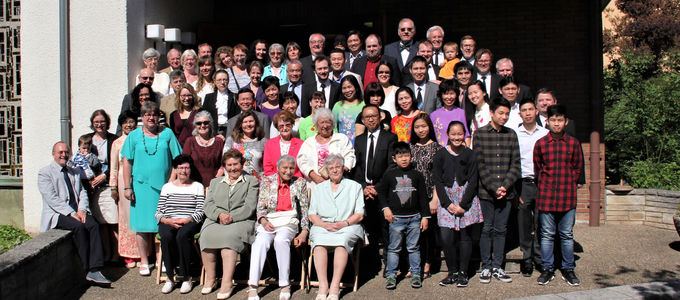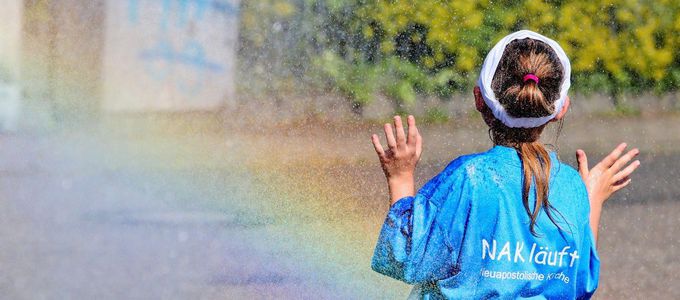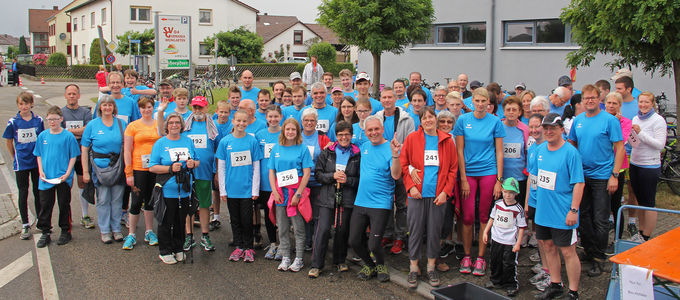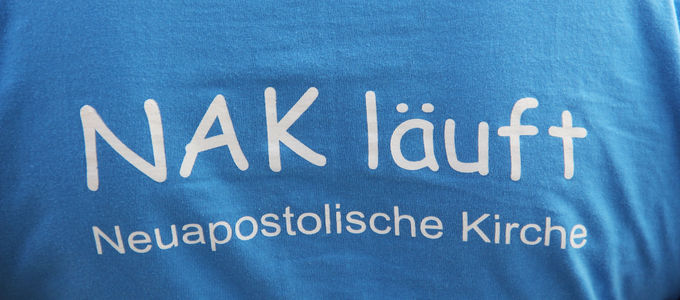
Their names are Max and Olga. They are 11 and 87 years old, respectively. And they have more than one thing in common: together with other members of their New Apostolic congregation, they participate annually in a campaign that saves human lives. But that’s not all.
It all began in 2006 when the church congregation of Weingarten in Southern Germany celebrated its 75-year anniversary. For this special occasion, the organisers had put together a programme with many activities, among them also a benefit concert, the proceeds of which were earmarked for blut.eV, an association of “Citizens for People Suffering from Leukaemia and Tumours”. In 2007 the members of the Weingarten congregation participated for the first time in the “Run for Life” organised by blut.eV. And they have continued to participate every year since.
The “Run for Life” — running for life
Whenever a person becomes sick with leukaemia, blut.eV launches a campaign to find new stem cell donors. The costs of these stem cell classifications are borne in part by the “Run for Life”.
Every participating runner has a sponsor who has pledged a specified amount for every lap (of 1.3 kilometres). The larger the number of participants, and the more laps they run, the higher the donation to blut.eV.
Commitment with growing demand
“At first it was only a few brothers and sisters from the congregation of Weingarten who ran along,” relates Evangelist Gerhard Schmitt, rector of the congregation. “But owing to some internet reports, more and more members from the Church districts of Bruchsal and the surrounding congregations began signing up. Children, young people, and adults of every age group—including some over the age of eighty—became involved.“
One of those who has been there since the beginning is Priest Frank Rottach. “Since 2007, my family and I have participated in the ‘Run for Life’,” relates the 53-year-old. “We only became aware of how important this campaign organised by blut.eV really is when a minister in one of our neighbouring congregations fell ill with leukaemia.”
Luisa, his daughter, also participates regularly in the “Run for Life”. “In my profession, I deal with children,” says the 22-year-old. “I know that even the youngest among them are not spared the risk of leukaemia. Through my participation in the ‘Run for Life’ I can give a glimmer of hope to those children suffering from leukaemia and to the parents affected, and for me this is true charity in practice.”
A T-shirt sparks interest
“For the annually occurring ‘Run for Life’ we acquired some T-shirts bearing the message, ‘NAC runs’,” explains Evangelist Schmitt. “On several occasions, ‘NAC runs’ has comprised the largest group of runners, and thanks to the tireless efforts of the participants, it is often also the group that manages the most laps.” The motto “NAC runs” has made many people curious, and started many a conversation, he says.
“In all those years, the support of the Missionswerk of the NAC Southern Germany—today known as ‘human aktiv’—made it possible for us to present donations of considerable size to blut.eV.”
For the members of the Weingarten congregation, the “Run for Life” has become a matter of the heart. The realisation that they are doing good things for their neighbour, their fellow citizens, and even complete strangers fills them with joy. But that is not the only special thing about the congregation.
Charity in practice for refugees too
As a result of the political events that transpired in the former GDR, many refugees came to West Germany in the autumn of 1989 after the fall of the Berlin Wall, among them also a number of Vietnamese who had been living in East Germany as guest workers. So it was that the municipality of Weingarten was also given an “allotment” of refugees, in this case from Vietnam. The billeting of these newcomers took place on 19 April 1990 in the Office of Workers’ Welfare.
Thi Hop Löffler, a Vietnamese woman by birth, who had been married and living in Germany for many years, read about this campaign in the Durlacher Blättle, a local paper. Since this involved her fellow citizens, she decided to become involved, and so contacted the then rector of the congregation of Weingarten.
The result was that divine services were soon offered in Vietnamese translation in the Weingarten congregation. The first of these divine services took place on 17 June 1990. The translator was none other than Thi Hop Löffler. As early as October 1990, three Vietnamese families were already baptised and integrated into the congregation. In December of that same year, they were sealed by District Apostle Klaus Saur in the congregation of Karlsruhe-Neureut.
The “Weingartners” supported their Vietnamese brethren wherever they could. They helped them acquire clothing and household goods, and accompanied them to appointments with doctors and the various authorities. The young people of the congregation provided combined German lessons and Religious Instruction. By the time the laws were revised in March 1991 to allow asylum seekers the right to work, the members of the Weingarten congregation had already found jobs for them.
In the meantime, the “Vietnamese congregation of Weingarten” has already celebrated its 25-year anniversary. In the course of his sermon, Apostle Herbert Bansbach emphasised that two very different cultures had come together when the Vietnamese congregation was established in the congregation of Weingarten. The question of which culture should adjust to the other never came up, however, because both congregations placed Jesus Christ in the centre and simply kept their eyes on Him.












